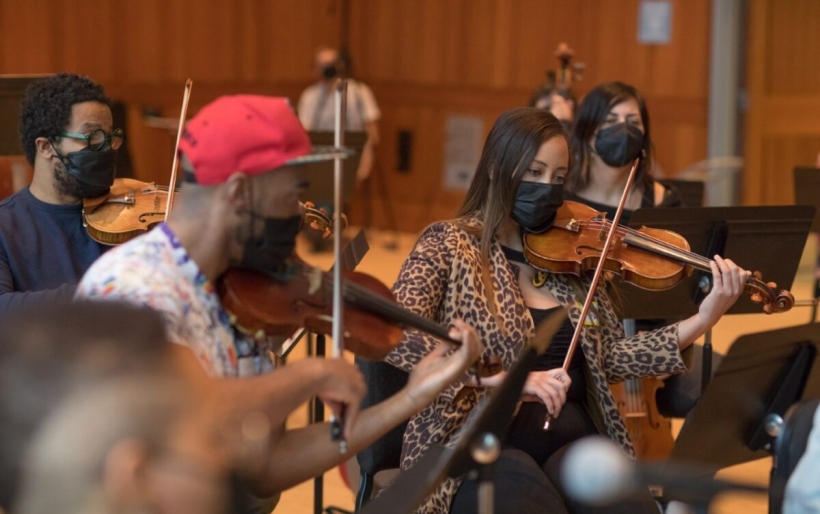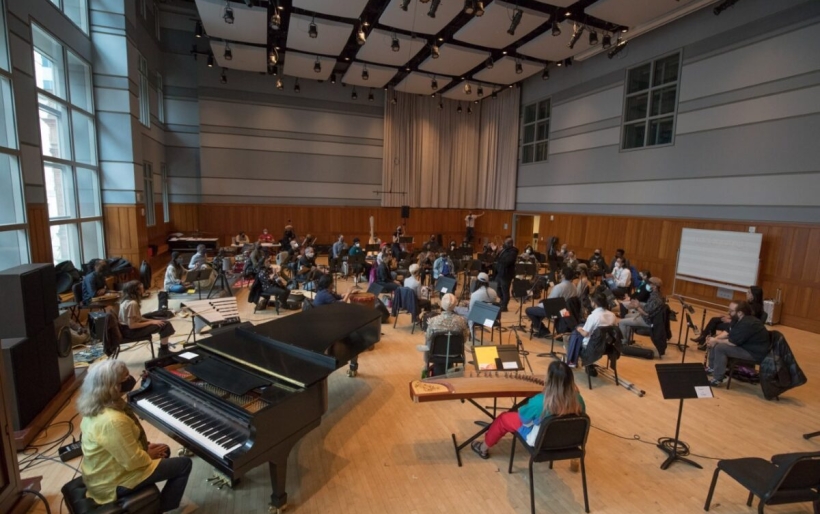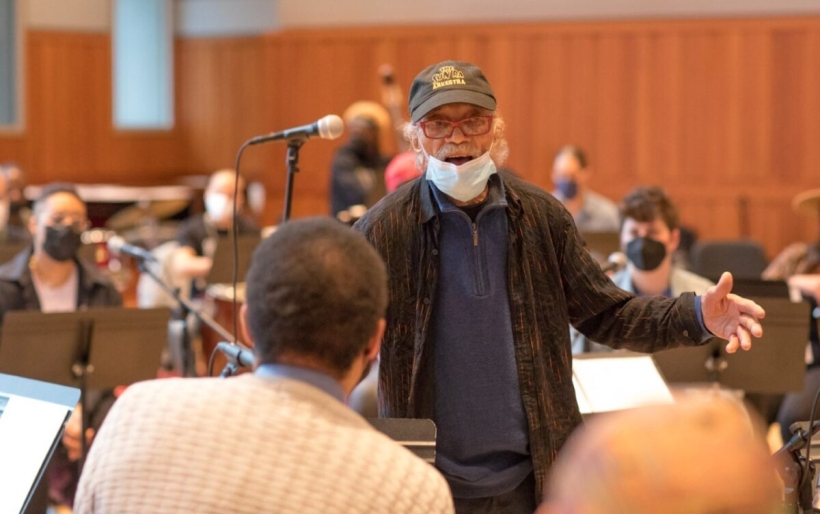TK: How would you describe the music that the Public Orchestra will play? What does it sound like, even if it might not sound the same every time?
AT: A very big part of what the orchestra is doing, along the lines of what Jay was saying, is spontaneous creativity. It’s kind of related to improvising, but in a slightly different way – if you’re familiar with the work of Butch Morris, for instance, “conduction.” we’ve been looking for a way we can find a space within pre-written compositions the composers might bring, between improvisation that the orchestra might bring, and between the organization that a conductor might bring. We’re looking for a way we can create music together that encompasses all of those things. In terms of what could it sound like, there are so many different traditions in the orchestra, so what it sounds like really depends on which people are playing at a particular moment. We were very conscious about trying to include as many traditions within Philadelphia as possible, so we wanted to include the West African tradition, we definitely include the Indian tradition, we definitely include some of the Native American tradition, we definitely include some of the Western classical tradition as well, and some of the gospel tradition, some of the hip-hop tradition, some of everything.
JF: In rehearsals, we’ve all had to become deep listeners. So we’re listening to each other, we’re feeding off each other in terms of ideas, we’re following what the composer is giving us, but we’re also really listening to one another. And that’s been a really incredible process, in terms of developing, listening deeply and finding those spots where someone can be featured, someone comes out and we can support that. We’re really trying to support each other in this musical context.
ABM: Jay just spoke about deep listening and supporting. And this is what’s so interesting as model, because there grows a kind of empathy then of seeing things through other people’s eyes. Again, the Western classical orchestra is great for what it does but it’s very specific in what it does and it’s very hierarchical. You do have the conductor, the maestro who stands in front of the orchestra, and you do have these compositions which are usually very, very fixed, in fact in every detail. And I think working in this other way where we have scores, but there’s a kind of freedom as people are testing different limits, different boundaries, supporting each other, listening, this is thinking – through music – about how we can live together. We have laws, we do live under a certain score, there is a society that tells us how we need to function, what not to do and who society says we are. And we’re testing the limits of that, or when is the right moment to break out of that, the right moment to break a law sometimes. This is part of it, a political aspect to it as well.
JF: In a way, Ari’s created something where he’s giving voice to the musicians in the orchestra; he’s giving us a voice to be able to contribute, and that’s where I think respect becomes the underpinning. We have to learn to respect one another, and from that we can then have the conversations and the exchanges that we can grow from. So it’s a really wonderful metaphor, I think, for how society should look: all these different voices coming together, respecting one another so that we can grow. I’m growing every time I’m in a rehearsal, I’m learning something new, I’m engaging in a different way than I’ve done before, and that’s enhancing my development as a musician, but enhancing my development as a human being as well.
TK: I was excited to hear that the “Duet” module includes impromptu performances with musicians and strangers in public spaces, like on a sidewalk. How do the musicians prepare for this?
ABM: Yeah, duet is a piece of mine, the only work that’s actually part of an existing work, from 2014. It’s very simple, two pages of notes a cappella, no text, La La La, and I made the piece about having a situation where two strangers would face each other and sing together. Because this is a very rare and weird thing, beautiful thing, but it doesn’t usually happen in normal life, let’s say, [laughs] and I wanted to make that encounter. In a way it’s a very simple piece: you have two music stands, you have these notes, and you have someone asking someone else, Would you like to sing with me? If they say no, that’s fine, if they say yes, then again it’s about rehearsing. They teach them but they don’t have to read notes, they say, This is the first melody, this is the second melody, La La La, La La La. And they rehearse for about ten minutes or so, then they perform it together, then they go their separate ways, but they’ve had this moment together. And so musically it’s very easy to teach, and doing it is an experience! I’ve done the piece all over the world – what’s interesting is that it’s quite simple but it takes on the context of where you do it. So when I do it in museums or places like that, it becomes something about singing and music in a museum, and you’re putting this on display; when I’ve done it in Cairo it became very political, could a man sing with a woman, could a veiled woman sing with a non-veiled woman, it became controversial. And so in Philadelphia it will become about Philadelphia, about the interactions that happen there.
I don’t think any musician who’s doing it has ever done something like that before, but I do teach it to them and we do talk about how you can’t plan for everything, that’s how this is a piece but it’s never a finished piece. But it’s very generous, just asking, would you like to sing with me, is a generous offer, and usually people are very happy after they do it; it usually leads to nice moments. But for everyone performing it, from the choirs that we’re working with, for them it’s gonna be very new, and I’m sure they’re nervous about it but I’m sure it’ll be great.
JF: I am actually one of the singers in the duet!
ABM: You’ll see! It’s very special, singing with a stranger is very intimate. It’s kind of like you’re having a conversation with someone except it’s very little talking, not about Hello, what’s your name, it’s really about rehearsing this piece of music.
JF: And we’re going to be learning the piece on Thursday so we haven’t even seen the music. [laughs] It’s good – we’re into it.
TK: And the “Solo” module includes solo performances all over the city. How did you decide on these locations and who would perform at each?
ABM: Yeah, the “Solo” is very much about the individual in the face of power, so I knew that the locations had to be places of power. And I made a long list, and a lot of them just said no, no way, no no. [laughs] But for instance the police – in a way, surprisingly – said yes, and City Hall said yes, and some places did want to engage with us. It was really about thinking about what are the places of power in Philadelphia. So we have the police headquarters, we have City Hall, we have the school district headquarters which is such an important seat of power – even if we don’t always think of it, actually they determine the course of so many lives, in the sense of where children go to school and what opportunities they have. We are also at Penn Medicine, again COVID and hospitals [tell us so much] about Philadelphia, so that seemed to me important. And then it was really nice that a bit later, coming aboard as a kind of balance to those four kind of monolithic power structures we have Community Legal Services, which also has a kind of power but their power is a different kind of power, so I was very happy to bring that in and highlight the work that they’ve been doing for so long.
Then the way “Solo” works is that the performers are not “professionals,” but some people who were working at those places, so once we found the places it was about how to find who would be interesting and who would be interested, who would be willing to be a performer. And it was a long process but we finally were able to find performers at each location and pair them with artists who were making miniature solos for each of those performers.
TK: To wrap up, what part of the program are you each most excited for?
AT: I would say I am most excited – very selfishly – for the Public Orchestra. And I’m also the most apprehensive about the Public Orchestra, just because it’s a giant experiment. And for me, the combination of excitement and apprehension, those are two things I’m used to because I’m sort of a jazz musician, so that’s a natural state for me.
JF: Ditto to Tidd. [laughs] The Public Orchestra is going to be really exciting, I think we’ll really be able to communicate the essence of the project in those performances. And I hope people can come out and really tune into what we’re doing, because it’s gonna be special.
ABM: For me, of course the Public Orchestra is the largest module, it’s really the culmination of the whole project, a lot of the ideas about power and about being together – In other words, if you take solo, duet and ensemble, and you put them together – it’s all in the orchestra. I’ve worked with orchestras but this is really something new created in Philadelphia for this project. So, although I’m super excited about the whole thing happening, it’s the Public Orchestra and that last weekend I’m really excited about.
//
Rehearsing Philadelphia begins this Friday, March 25th, and runs until April 10th. Find a full calendar of performances, a map of their locations, and a list of all performers and composers at rehearsingphiladelphia.com. Notably, all the events are completely free and most are open to the whole public – even passersby who don’t expect to hear music – except for a few in indoor spaces which require free registration just to avoid overcrowding and promote safety.



